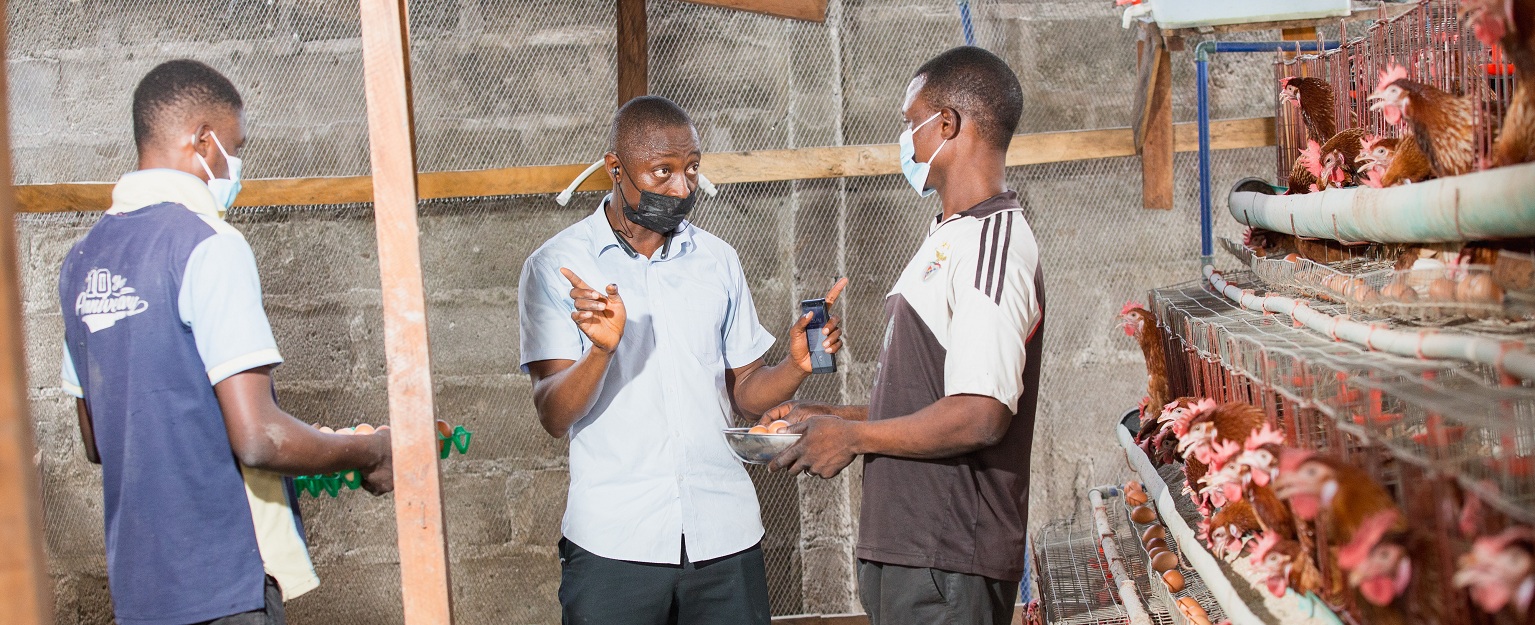REDUCING POVERTY
Surviving COVID-19 Threat: Poultry Sector
Our poultry-value-chain project is working to help poultry farmers and processors increase their productivity, sales, and income while generating new jobs by adopting good poultry farming and business practices—as well as access to extension services, quality inputs, funding, and markets.
Summary of Outcomes in 2020
5,133
1,001 New Jobs
2,202
NGN One (1) billion
NZEOTA PRINCE UCHE: GIVING NEW POULTRY FARMERS A HEAD START!
“My name is Nzeota Prince Uche, from Abia State, married to a lady from Osun State, and we have three (3) children. I am a poultry farmer and poultry service provider too. I am also into fish and snail farming. I have known PIND for about four (4) years now. When I came to PIND, I was doing like 50-100 broilers. After attending so many trainings from PIND [on NAEC (Nigerian Agricultural Enterprise Curriculum) visioning, marketing, and sales], both online and offline, we have scaled up. Right now, we have three (3) permanent staff and two (2) indirect staff. Then, we have moved the poultry business from 50-100 to about 350-500 broilers and about 1,000 for layers.
I have been able to train other poultry farmers. So far, I have helped set up four (4) to five (5) farms that are around me, and the farmers are running the business on their own, but I give them advice, and they are seeing improvements. One (1) of the farmers happens to be my sister. She started with about 20-50 broilers. Right now, she is doing about 150, and she is about taking delivery of about 500 layers to incorporate. Initially, she was doing the poultry farming inside her compound using just her gateman to augment. Now she wants to employ two (2) persons to help with the business, and she is taking the farm from the back side of her house to a one-and-a-half-hectare (1.5 ha) plot of land.”
The poultry value chain comprises farmers involved in bird and egg production supported by several poultry service providers PSPs, processors, input companies, and village-level dealers VDLs for optimal performance.
Pandemic-triggered restrictions limited the access of poultry farmers to essential inputs—like day-old chicks (DOCs, feed, veterinary inputs, markets, support services, and funding. It also led to an increase in the cost of production and a drop in the supply of inputs. This was due to the scarcity of raw materials such as maize and soybeans required to produce feeds. The feed price went up by seven (7) percent to ten (10) percent, while the cost of DOCs doubled.
The ban on social gatherings reduced demand for poultry products while financial institutions limited their operations and loan disbursements. The PSPs could not hold physical trainings on best poultry practices for farmers. At the same time, input companies could not freely move inputs to the poultry farmers.
A poultry farmer’s profitability is dependent on good production practices and the effective use of inputs. To survive the pandemic problems, poultry farmers turned more to the poultry service providers for help in addressing the challenges of access to essential information and inputs. In response, the poultry service providers tweaked their approaches and adapted their services to enable them to support farmers.
The PSPs secured the waiver for free movement of agro products, which facilitated free movement for the poultry sector to conduct their activities. The exemption enabled the service providers to deliver products (such as vaccines, feeds, and DOCs) to poultry farmers for a fee. They also formed relationships with the input companies and helped them to reach more poultry farmers in more locations with support services.
Others used technology platforms—like phone calls, social media, text messages, WhatsApp, and Zoom—to interact with the poultry farmers to make up for the reduced physical visits and organized training programs for a maximum of 20 farmers to comply with COVID-19 guidelines. The PSPs also provided information to their farmers on how to access the government stimulus packages to reduce the impact on their businesses and gain new clients as more farmers turned to them for support in overcoming the pandemic-related issues.
Through the support of the PSPs, poultry farmers used social media platforms to advertise and sell their produce, targeted market days to sell their produce, started direct sales around their neighborhoods, and sought out stimulus packages from the government.
PIND isolated the poultry sector as a separate value chain from its MSME-development project in 2020, with an immediate focus on enhancing the quantity and quality of support services available to poultry farmers for increased productivity.
PIND trained 19 new PSPs to support the expansion of training activities to farmers in the Niger Delta. Additionally, we supported existing poultry service providers, village-level dealers, and other market actors to provide technical and business training; linkages to markets and funding; vaccination of birds; and the supply of DOCs, feed, and vaccines to poultry farmers.


